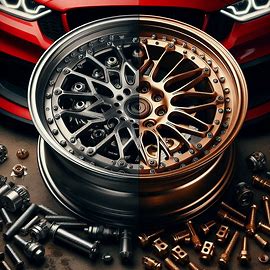
Introduction
When upgrading your car’s wheels, two popular options dominate the market: alloy wheels and forged wheels. Both offer distinct advantages in terms of performance, durability, and aesthetics. However, choosing the right one depends on your driving needs, budget, and vehicle type.
This guide will compare alloy vs. forged wheels, examining their manufacturing processes, benefits, drawbacks, and ideal use cases to help you make an informed decision.
1. What Are Alloy Wheels?
Alloy wheels are made from a blend of metals, primarily aluminum and nickel or magnesium, making them lighter than traditional steel wheels. They are manufactured through casting, where molten metal is poured into a mold and cooled.
Pros of Alloy Wheels:
✅ Lighter Weight – Improves fuel efficiency and handling.
✅ Affordable – More budget-friendly than forged wheels.
✅ Aesthetic Variety – Available in numerous designs and finishes.
✅ Corrosion Resistance – Better than steel wheels.
Cons of Alloy Wheels:
❌ Less Durable – Prone to cracks under extreme stress.
❌ Weaker Structure – Casting process can create air pockets, reducing strength.
2. What Are Forged Wheels?
Forged wheels are made from a solid block of aluminum or magnesium, which is heated and pressed into shape under extreme pressure. This results in a denser, stronger wheel.
Pros of Forged Wheels:
✅ Superior Strength – Can withstand high stress and impacts.
✅ Lighter Than Alloy Wheels – Enhances performance and acceleration.
✅ Premium Look – Often used in high-end and performance vehicles.
✅ Longer Lifespan – More resistant to bending or cracking.
Cons of Forged Wheels:
❌ Expensive – Significantly higher cost due to complex manufacturing.
❌ Limited Designs – Fewer style options compared to alloy wheels.
3. Key Differences: Alloy vs. Forged Wheels
| Feature | Alloy Wheels | Forged Wheels |
|---|---|---|
| Manufacturing | Casting method | Forged from solid metal |
| Weight | Light | Even lighter |
| Strength | Moderate | Extremely strong |
| Cost | Affordable | Expensive |
| Durability | Good | Excellent |
| Customization | Many designs | Limited options |
4. Which is Best for Your Car?
Choose Alloy Wheels If:
✔ You want a budget-friendly upgrade.
✔ You prioritize style variety over extreme performance.
✔ You drive in normal conditions (city/highway).
Choose Forged Wheels If:
✔ You need maximum strength (off-roading/racing).
✔ You want the lightest possible wheels for speed.
✔ You’re willing to invest in premium durability.
5. Maintenance Tips for Both Wheel Types
-
Regular Cleaning – Prevent brake dust buildup.
-
Avoid Harsh Chemicals – Use pH-balanced wheel cleaners.
-
Check for Damage – Inspect for bends or cracks periodically.
-
Proper Tire Pressure – Ensures even wear and longevity.
Conclusion
Both alloy and forged wheels have their unique advantages. Alloy wheels are a great choice for everyday drivers seeking affordability and style, while forged wheels excel in performance and durability for high-speed or off-road use.
Your decision should depend on budget, driving habits, and performance needs. Whichever you choose, proper maintenance will ensure your wheels last longer and perform at their best.